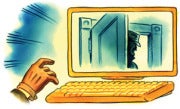Lewis
Member
The 21 Greatest PC Mysteries--Solved!
Find out why your documents won’t print, where your downloads disappear to, what a .dat file is, how those infernal toolbars invaded your browser, and much more.
 Illustration by Ross MacDonaldModern PCs are certainly marvels of technology--and yet for all their advances, computers still do crazy, inexplicable things. With the average machine, there's enough mystery to keep Sherlock Holmes or Miss Marple hopping for a month--and enough frustration to make the average user want to commit murder most foul.
Illustration by Ross MacDonaldModern PCs are certainly marvels of technology--and yet for all their advances, computers still do crazy, inexplicable things. With the average machine, there's enough mystery to keep Sherlock Holmes or Miss Marple hopping for a month--and enough frustration to make the average user want to commit murder most foul.
Computing mysteries tend to be less "Who dunnit?" and more "Why won't it?" For example, you may have puzzled over why Windows obstinately re**fused to let you delete a stalled print job, or wondered why you couldn't find the file you just downloaded. But worry not: We've rounded up these and other mindbogglers of the PC universe--and solved them for you.
(For explanations and helpful tips, click the links.)
Where did my downloaded files go? Why can't I find them?
Your browser chooses where downloads go, but you can control the process.
Why doesn't my iPad charge when I connect it to my computer?
Your PC's USB port doesn't supply enough juice--but you can still charge your iPad, gradually.
Why does a video play on my desktop but not my laptop?
If a computer doesn't have the specific decoder for a video format, you can't watch the video. Get the right one.
 Illustration by Ross MacDonaldMy printer won't print, and Windows won't allow me to cancel or delete print jobs. What's going on?
Illustration by Ross MacDonaldMy printer won't print, and Windows won't allow me to cancel or delete print jobs. What's going on?
Usually this is the result of a communication problem between the PC and printer. Get them talking.
I hear beeps when I turn on my PC. What do they mean?
Those beeps come from the BIOS (a piece of software built into the motherboard). Find out what a "beep code" means.
In a folder full of digital images, I often notice a file called Thumbs.db. What is it, and can I safely delete it?
Thumbs.db is a Windows XP system file that contains the thumbnail cache for a particular folder. You can tweak Windows to get it out of your way.
Why does every digital camera--even the one on my smartphone--insist on storing photographs in a folder called DCIM?
DCIM (for Digital Camera IMages) is the default directory structure for digital cameras--and having such a standard is very useful.
 Illustration by Ross MacDonaldMy Recycle Bin has disappeared. How do I go about restoring it?
Illustration by Ross MacDonaldMy Recycle Bin has disappeared. How do I go about restoring it?
Whether it was a victim of a glitch or never available in the first place, you can follow a few simple directions to restore the Recycle Bin.
Why does Windows sometimes reboot without my permission, and how do I prevent that from happening?
This problem relates to how Windows installs automatic updates. Fortunately, you can make some tweaks.
Where do all these mysterious Web browser toolbars come from, and how do I get rid of them?
Sometimes spyware installs browser toolbars, and sometimes you do it accidentally during software installation.
How did I end up with QuickTime on my PC, and do I need to keep it?
This media-playback software comes bundled with iTunes and installs along with it.
I have Microsoft Word installed on my PC. Why can't I open the .docx files my friend sent me?
If you use Word 2003 or an earlier version of the program, all you need is the Microsoft Office Compatibility Pack for Word, Excel, and PowerPoint 2007 File Formats.
 Illustration by Ross MacDonaldWhy won't Windows allow me to delete a certain file?
Illustration by Ross MacDonaldWhy won't Windows allow me to delete a certain file?
If Windows refuses to delete a file or folder, some application or process is accessing it.
Why do some programs leave files and folders behind even after I've uninstalled them?
Many programs' uninstallers are ineffective. Use a utility that removes not only the application but also all of the pieces it leaves behind.
Why do Adobe Reader and Java update so frequently? Do I have to allow it?
Most Adobe and Java patches are made to plug security holes, so you should update them--or use alternative software.
Is it absolutely necessary to update Windows?
Yes, you should definitely apply Windows updates for security reasons, but you can take a few steps to cut down Windows' nagging.
Does it matter whether I ‘Safely Remove' devices?
Absolutely: If you ignore Windows' requests to "Safely Remove" your storage media, you could end up with corrupted files, un**readable media, or both.
Windows asks me if I want to enable Sticky Keys. What are they, and how should I use them?
The Sticky Keys feature makes certain keyboard functions easier to access.
Why can't I send out a particular file attachment through e-mail?
The file is probably too large. Check out free services that let you work around file-size restrictions.
 Illustration by Ross MacDonaldHow can I determine whether an unknown Website is safe to visit?
Illustration by Ross MacDonaldHow can I determine whether an unknown Website is safe to visit?
Read our suggestions on figuring out whether a link is safe from malware or other threats before you click it.
What are the .dat files I sometimes receive in e-mail messages, and how do I open them?
Microsoft Outlook uses a modified version of Rich Text Format to preserve fonts and the like, but it often causes problems for the recipient. We have three suggestions for coping.
PC World
Find out why your documents won’t print, where your downloads disappear to, what a .dat file is, how those infernal toolbars invaded your browser, and much more.

Computing mysteries tend to be less "Who dunnit?" and more "Why won't it?" For example, you may have puzzled over why Windows obstinately re**fused to let you delete a stalled print job, or wondered why you couldn't find the file you just downloaded. But worry not: We've rounded up these and other mindbogglers of the PC universe--and solved them for you.
(For explanations and helpful tips, click the links.)
Where did my downloaded files go? Why can't I find them?
Your browser chooses where downloads go, but you can control the process.
Why doesn't my iPad charge when I connect it to my computer?
Your PC's USB port doesn't supply enough juice--but you can still charge your iPad, gradually.
Why does a video play on my desktop but not my laptop?
If a computer doesn't have the specific decoder for a video format, you can't watch the video. Get the right one.

Usually this is the result of a communication problem between the PC and printer. Get them talking.
I hear beeps when I turn on my PC. What do they mean?
Those beeps come from the BIOS (a piece of software built into the motherboard). Find out what a "beep code" means.
In a folder full of digital images, I often notice a file called Thumbs.db. What is it, and can I safely delete it?
Thumbs.db is a Windows XP system file that contains the thumbnail cache for a particular folder. You can tweak Windows to get it out of your way.
Why does every digital camera--even the one on my smartphone--insist on storing photographs in a folder called DCIM?
DCIM (for Digital Camera IMages) is the default directory structure for digital cameras--and having such a standard is very useful.

Whether it was a victim of a glitch or never available in the first place, you can follow a few simple directions to restore the Recycle Bin.
Why does Windows sometimes reboot without my permission, and how do I prevent that from happening?
This problem relates to how Windows installs automatic updates. Fortunately, you can make some tweaks.
Where do all these mysterious Web browser toolbars come from, and how do I get rid of them?
Sometimes spyware installs browser toolbars, and sometimes you do it accidentally during software installation.
How did I end up with QuickTime on my PC, and do I need to keep it?
This media-playback software comes bundled with iTunes and installs along with it.
I have Microsoft Word installed on my PC. Why can't I open the .docx files my friend sent me?
If you use Word 2003 or an earlier version of the program, all you need is the Microsoft Office Compatibility Pack for Word, Excel, and PowerPoint 2007 File Formats.

If Windows refuses to delete a file or folder, some application or process is accessing it.
Why do some programs leave files and folders behind even after I've uninstalled them?
Many programs' uninstallers are ineffective. Use a utility that removes not only the application but also all of the pieces it leaves behind.
Why do Adobe Reader and Java update so frequently? Do I have to allow it?
Most Adobe and Java patches are made to plug security holes, so you should update them--or use alternative software.
Is it absolutely necessary to update Windows?
Yes, you should definitely apply Windows updates for security reasons, but you can take a few steps to cut down Windows' nagging.
Does it matter whether I ‘Safely Remove' devices?
Absolutely: If you ignore Windows' requests to "Safely Remove" your storage media, you could end up with corrupted files, un**readable media, or both.
Windows asks me if I want to enable Sticky Keys. What are they, and how should I use them?
The Sticky Keys feature makes certain keyboard functions easier to access.
Why can't I send out a particular file attachment through e-mail?
The file is probably too large. Check out free services that let you work around file-size restrictions.

Read our suggestions on figuring out whether a link is safe from malware or other threats before you click it.
What are the .dat files I sometimes receive in e-mail messages, and how do I open them?
Microsoft Outlook uses a modified version of Rich Text Format to preserve fonts and the like, but it often causes problems for the recipient. We have three suggestions for coping.
PC World
 Get Mac or Linux and your overpriced mysteries will cease.
Get Mac or Linux and your overpriced mysteries will cease.
